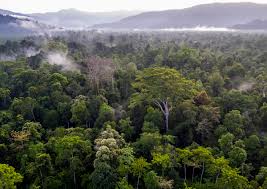News
Fined for deforestation included in portfolio of year’s most profitable agribusiness fund

Original article posted by Reporter Brasil
WITH A RETURN OF 52.5% in just the first four months of this year, an agribusiness investment fund managed by SFI Investimentos includes in its portfolio financial assets linked to a group from Mato Grosso with a history of Amazon deforestation.
Fixed-income securities tied to the operations of Agropecuária Três Irmãos Bergamasco, headquartered in Tapurah (MT), represent 36% of the total amount invested by the fund in CRAs (Certificates of Agribusiness Receivables)—private bonds used to finance agribusiness activities. The Três Irmãos CRA is the fund’s largest investment.
In its latest management report, published in April this year, SFI Investimentos highlights that the Três Irmãos Farm, the group’s main property, operates with a “high-tech production system” and “social and environmental responsibility.” However, since 2015, environmental agencies have identified illegal clearing of native vegetation on this very property.
An analysis published by Infomoney ranks SFI Investimentos’ agribusiness fund as the most profitable Investment Fund in Agroindustrial Chains (Fiagro) from January to April 2025.
The Três Irmãos CRA is also part of the investment portfolio of Fiagro Galápagos Agribusiness Receivables, managed by Galápagos Capital. This fund ranked fourth in profitability during the same period, with a 22.4% return.
The list of top-performing Fiagros was compiled by Quantum Finance, analyzing the 42 funds listed on Brazil’s stock exchange (B3) that have generated profits since January.
Environmental violation history
Since January 2022, part of Agropecuária Três Irmãos Bergamasco’s operations has been financed through the sale of securities on the capital market. The issuance of these securities was structured by Reit Securitizadora, which is responsible for “transforming” the group’s debts into tradable bonds.
José Osmar Bergamasco, one of the group’s partners, was fined by IBAMA in June 2015 for unauthorized burning of 133 hectares on the Três Irmãos Farm. He was fined R$134,000 (23,500 USD) by the environmental agency.
This fine led the Public Prosecutor’s Office of Mato Grosso (MPMT) to file a civil lawsuit in February 2022 against José Osmar, Luiz Antônio, and Valter Mário Bergamasco—the three brothers who founded Agropecuária Três Irmãos Bergamasco.
The Três Irmãos Farm also has embargoed areas due to illegal deforestation identified by the Mato Grosso State Environmental Secretariat (Sema-MT). The embargoes were registered in the company’s name in October 2023. Sema-MT found that 74 hectares of native vegetation had been cleared without authorization in protected areas of the property.
In August 2024, MPMT denounced the continuation of deforestation in the embargoed area and requested a judicial embargo to prevent further violations and ensure vegetation recovery. “Was it really necessary to destroy more forest for agricultural production? Weren’t the already vast consolidated hectares enough to generate profits?” the MPMT asked in the lawsuit, which Repórter Brasil accessed.
In response at the time the case was filed, the Bergamasco brothers’ attorneys argued that the 2015 deforestation was, in fact, pasture burning in an already consolidated area—not native vegetation. The case is still ongoing.
In addition to the company-related embargoes, Sema-MT also issued embargoes in 2021 on areas of Três Irmãos Farm in the names of Luiz Antonio and Valter Mário Bergamasco. The deforestation in these cases occurred in 2020.
Repórter Brasil contacted Agropecuária Três Irmãos Bergamasco and the law firm representing the brothers but received no response as of the publication deadline. Reit Securitizadora and investment firms SFI Investimentos and Galápagos Capital also did not respond. The space remains open for future comments.
Company under judicial reorganization
The Três Irmãos CRA, which offered R$36 million (6.3 million USD) in bonds maturing in 2027, is backed by CPR-Fs (Rural Producer Financial Notes), under which the producer commits to future payment in cash. According to transaction documents, part of the Três Irmãos Farm and the group’s soybean production were pledged as collateral in case of default.
In November 2023, Agropecuária Três Irmãos entered judicial reorganization, with debts totaling R$124 million. Reit Securitizadora sued the Bergamasco group to seize the Três Irmãos Farm. On the 7th of this month, the court ruled that the property will be auctioned.
In an attempt to retain the property, Ex Lege—the court-appointed administrator representing the company—argued that “the entire productive base of the Valter Bergamasco Group is located on the Três Irmãos Farm, which is also the group’s main facility.”
Expert Demands Transparency
Granting rural credit to properties with environmental embargoes is prohibited under Central Bank regulations. However, these rules do not apply to private bonds like CRAs, which fall under the specific regulations of Brazil’s Securities and Exchange Commission (CVM).
A 2023 CVM resolution outlines criteria for disclosing “financial information related to sustainability” by public companies, investment funds, and securitization firms. However, such disclosure is voluntary.
Maria Eduarda Senna Mury, legal research and litigation director at Harvest—a group that brings legal action against climate change—says transparency is a major weak point in the financial sector.
For Fiagros in particular, Mury notes that fund platforms do not disclose relevant socio-environmental information about CRAs. “So it’s possible that there are environmental violations directly linked to the producer who issued the CPR-F that backed the CRA, which in turn enters the Fiagro—tainting the whole chain,” she explains.
Detailed regulation is needed, Mury argues. “The sector’s main gaps are the lack of explicit, detailed, and standardized legal requirements for environmental due diligence specific to CRAs and the failure to publicly disclose all relevant information clearly to the general public,” she says.
In response to Repórter Brasil’s inquiries, the CVM stated that it is the securitization company’s “responsibility to ensure the environmental compliance of the issuances,” and that in case of noncompliance, “securitization companies will be subject to the investigation of possible liabilities through sanctioning proceedings.” However, the CVM did not clarify what those liabilities would be. The agency also noted it is “continually updating the regulation and oversight” of products and companies operating in Brazil’s securities market.